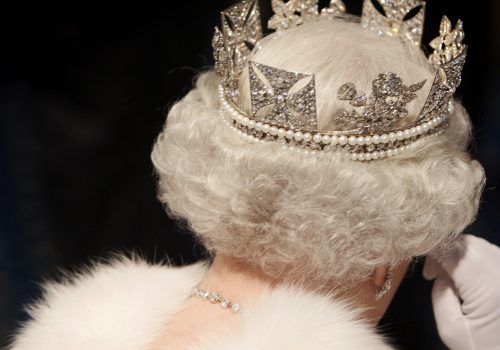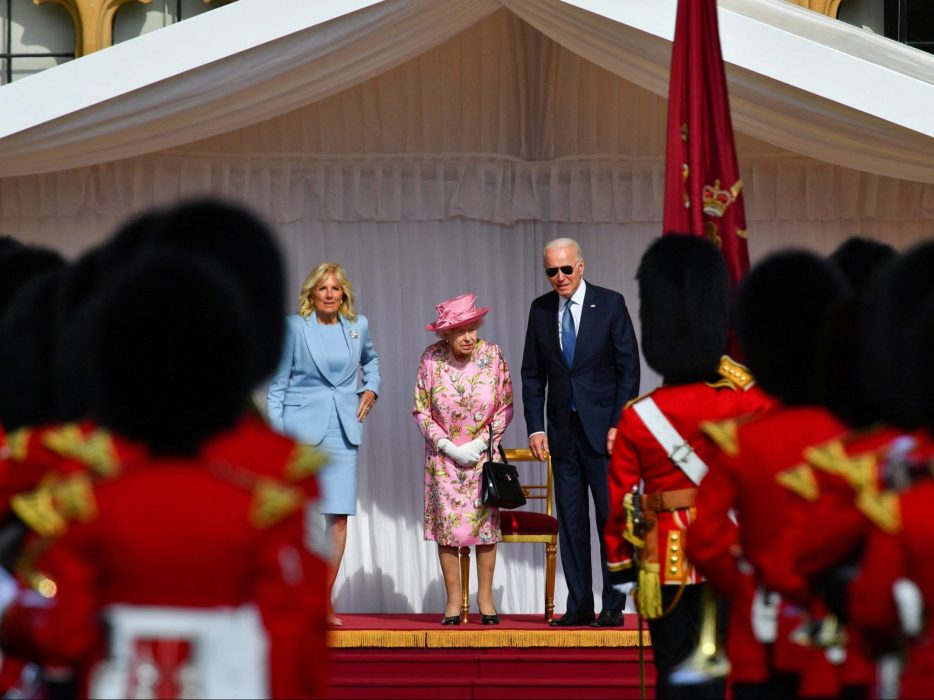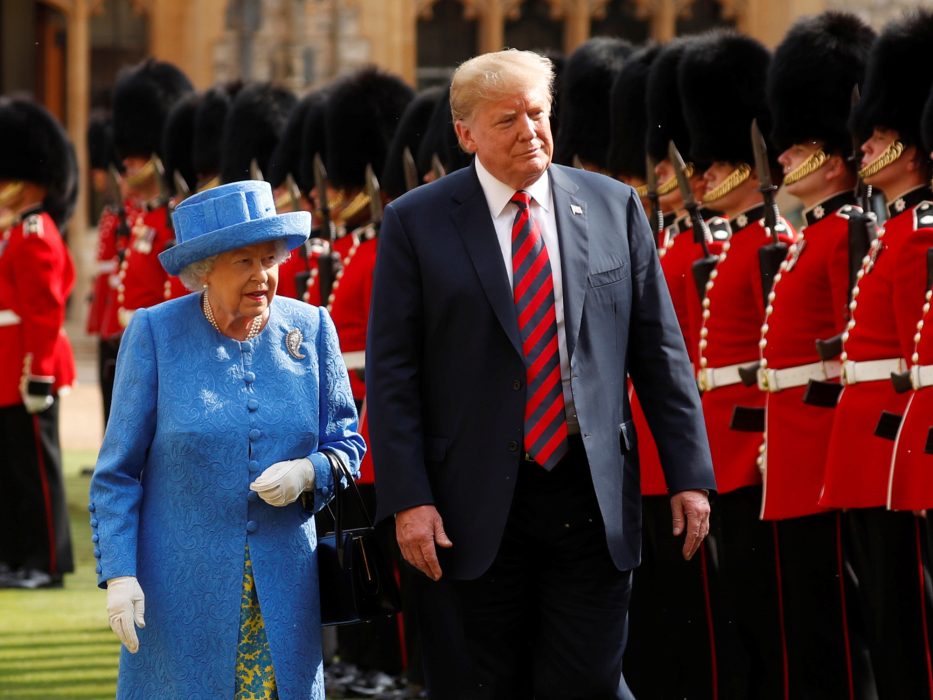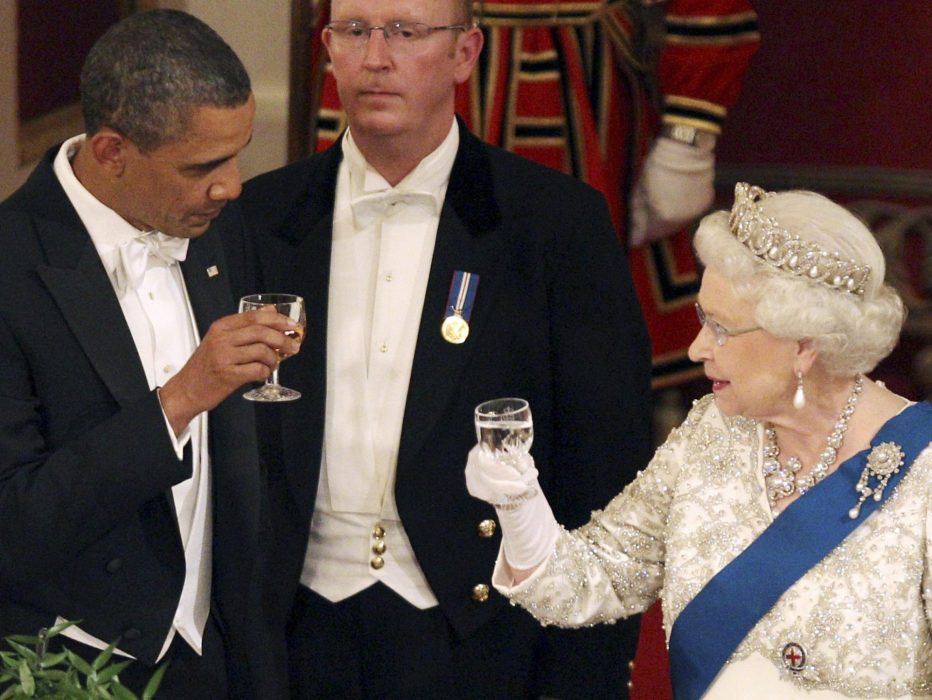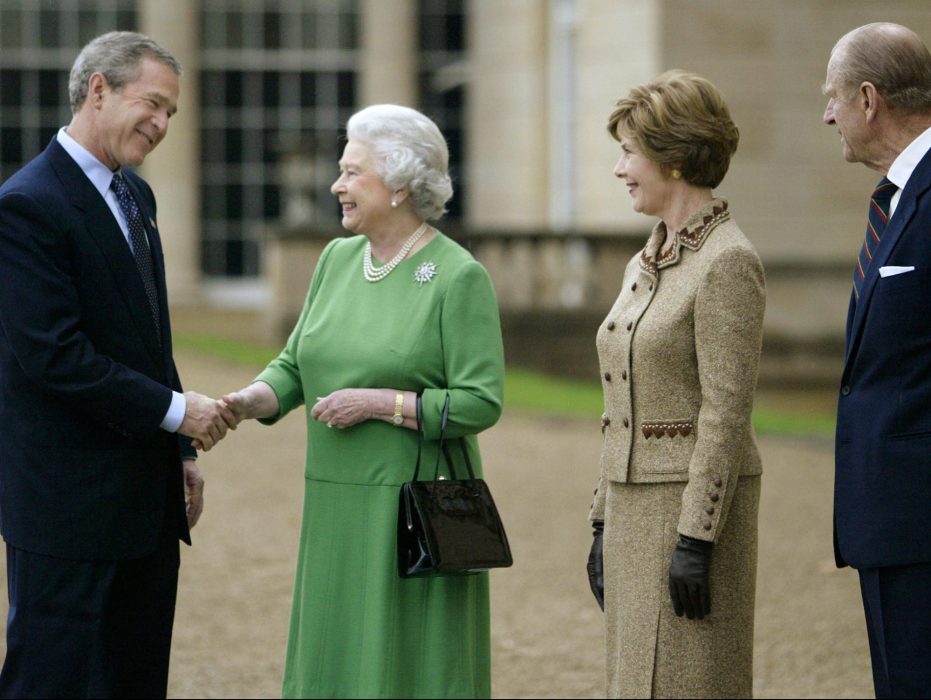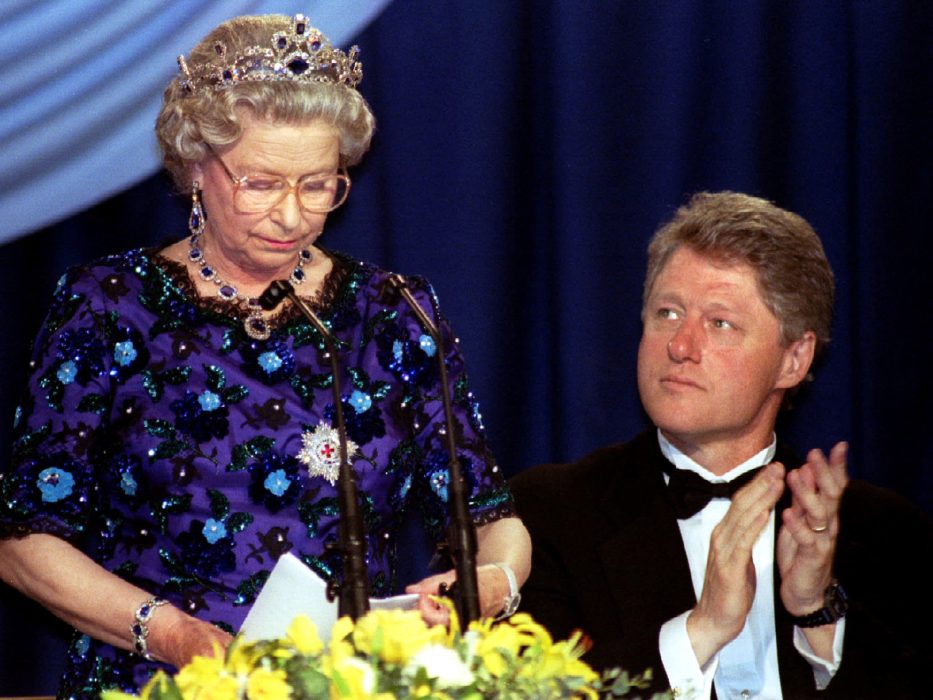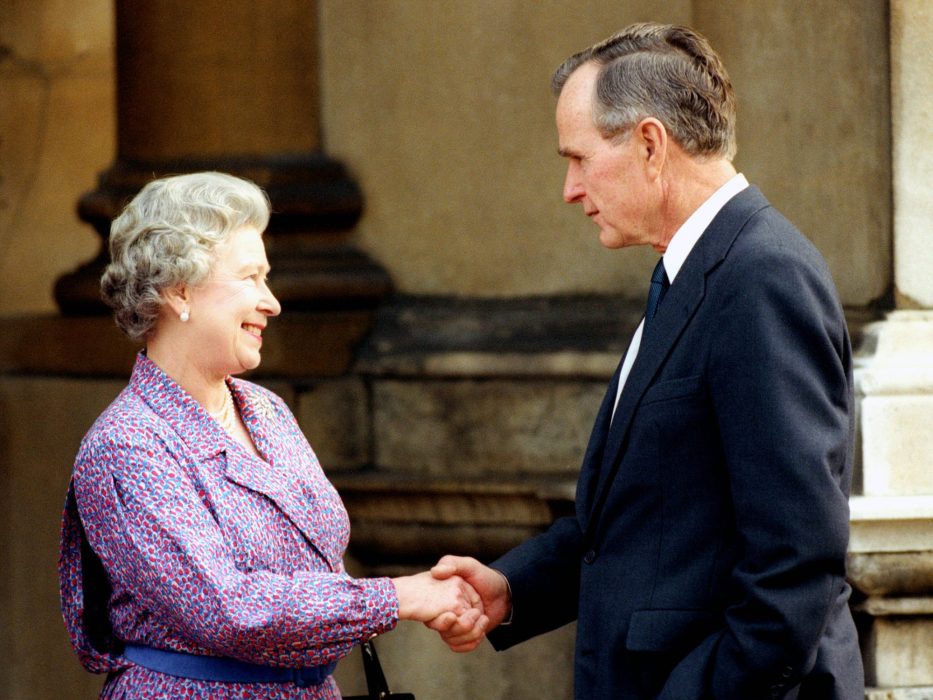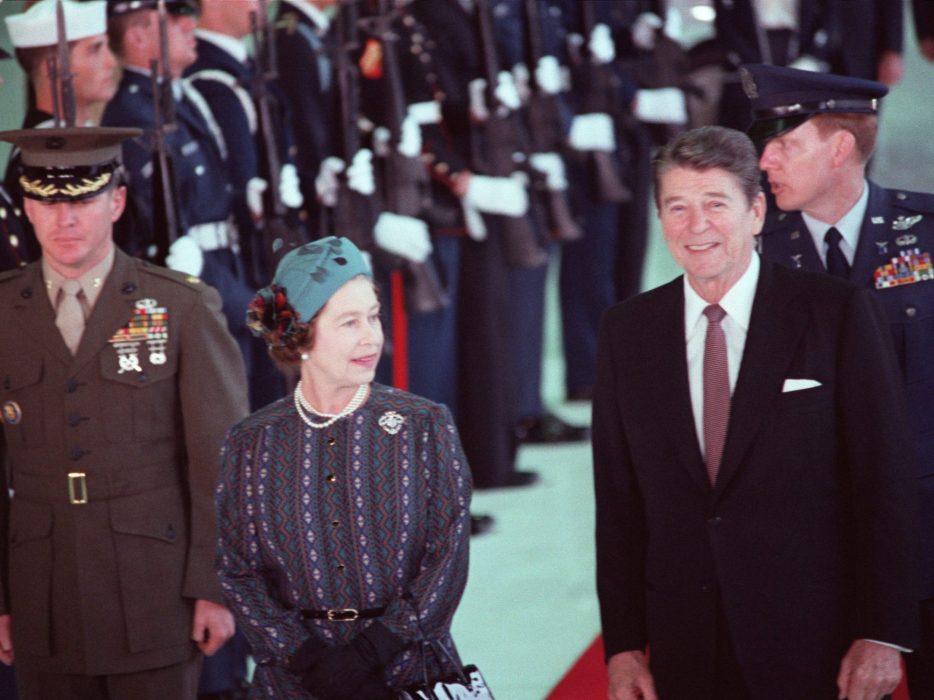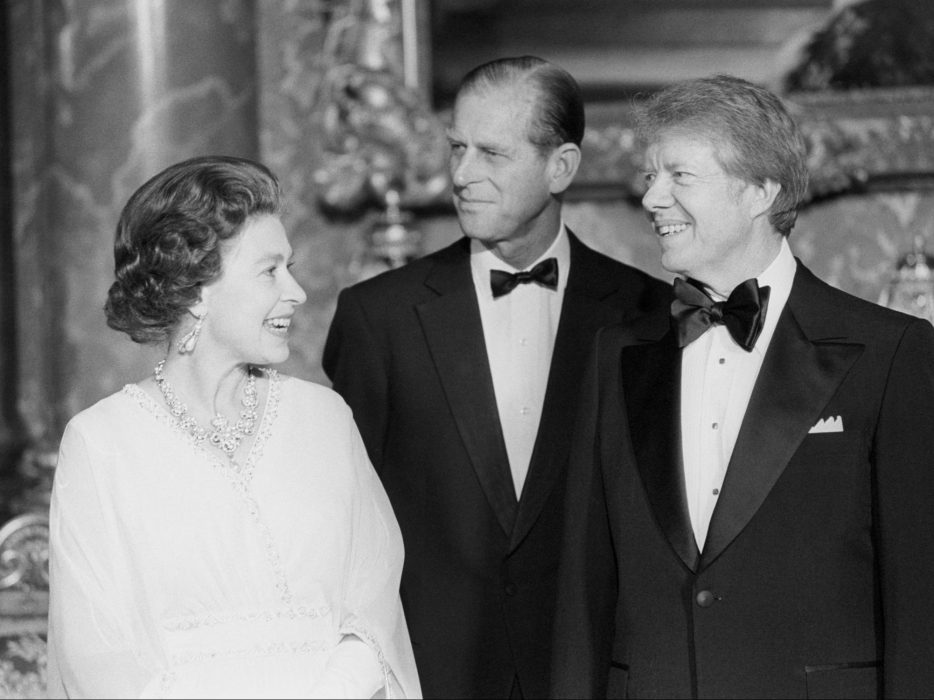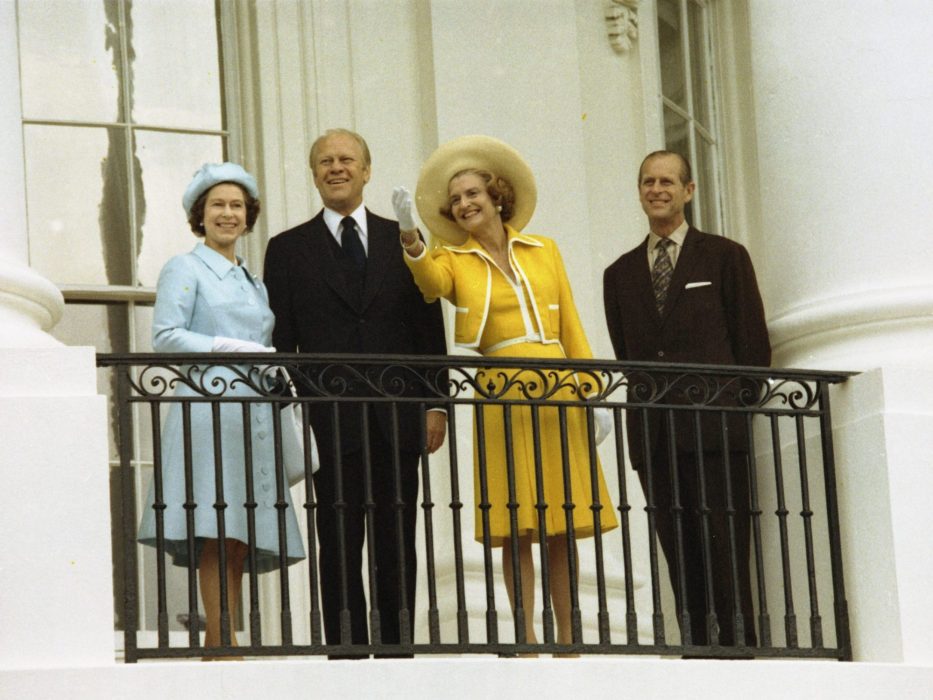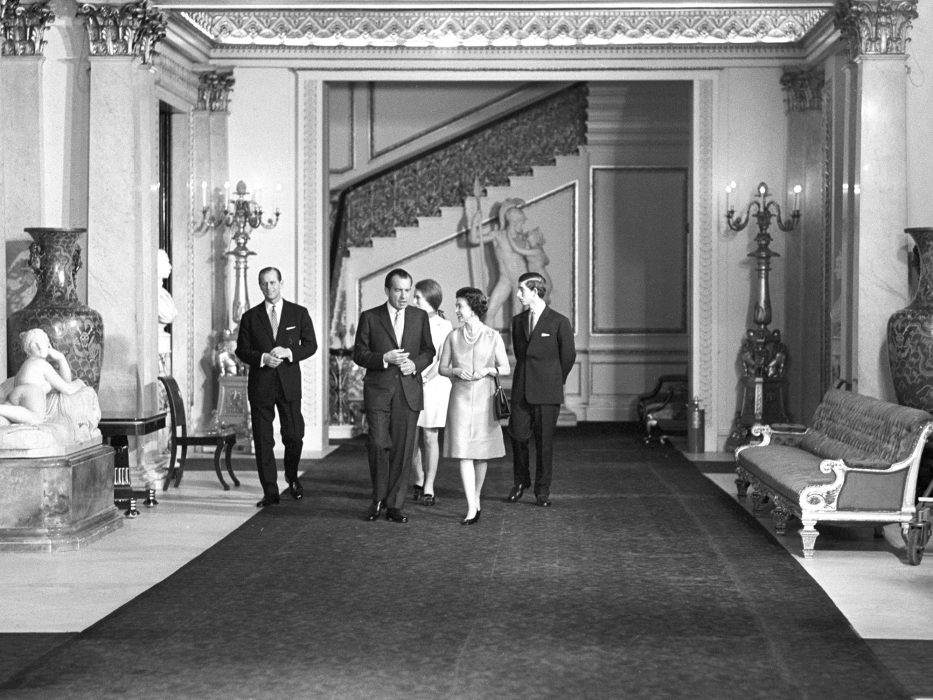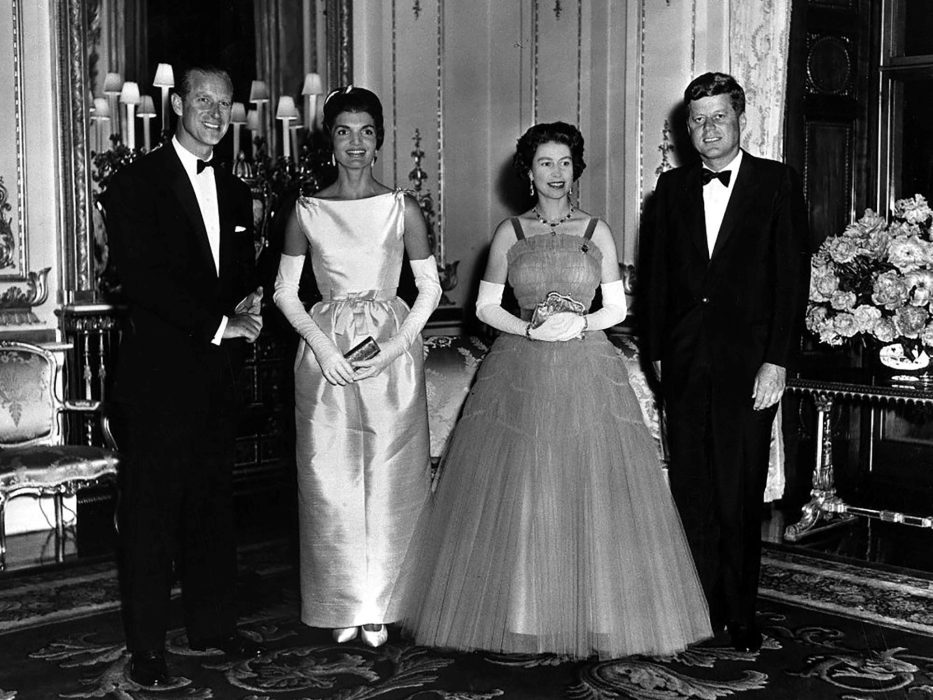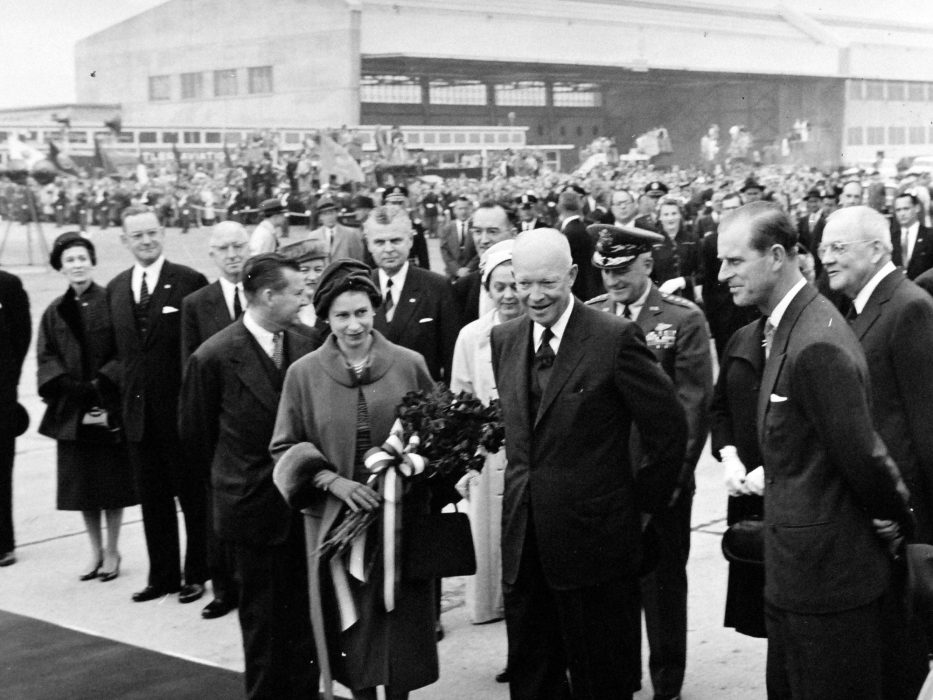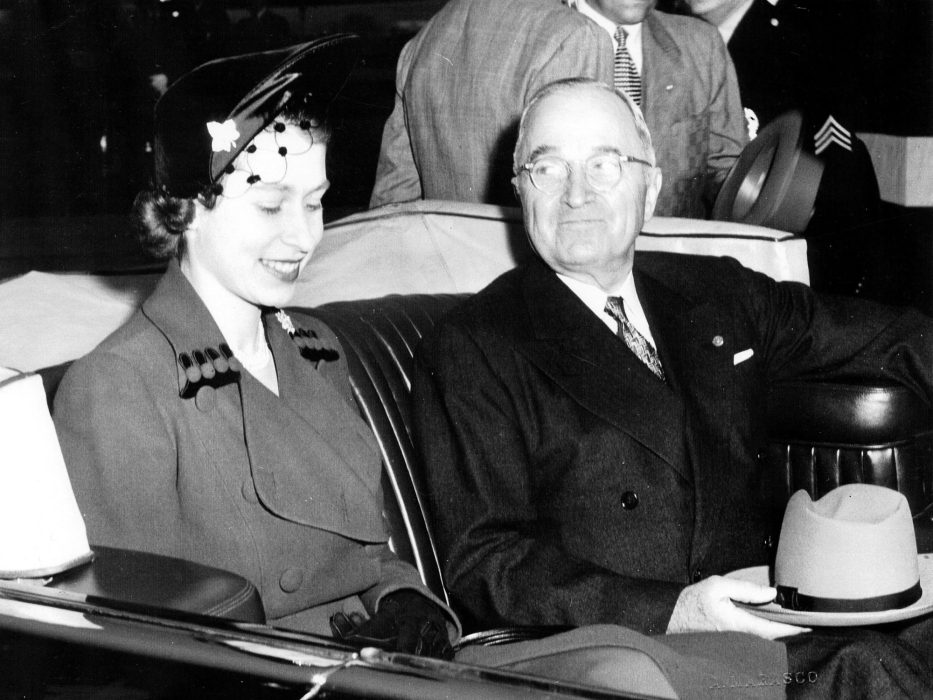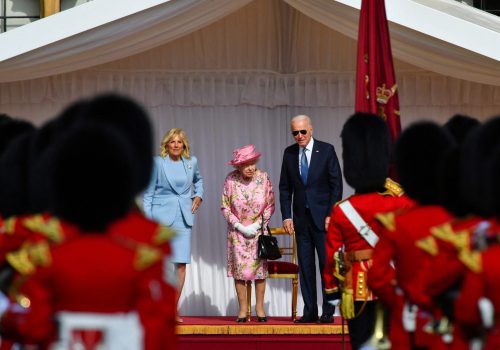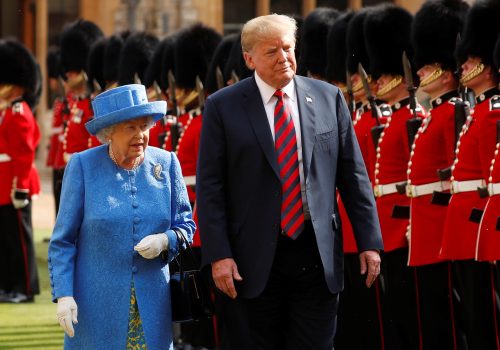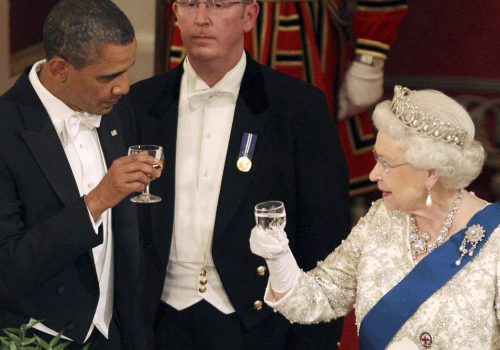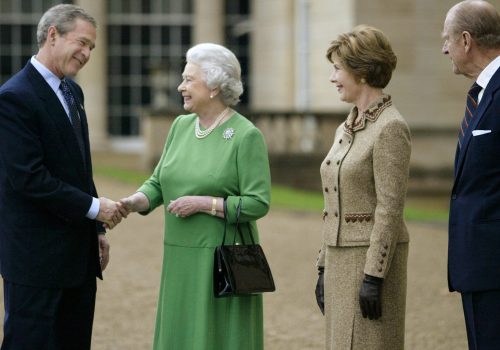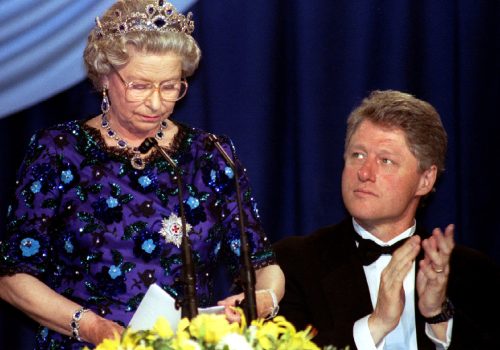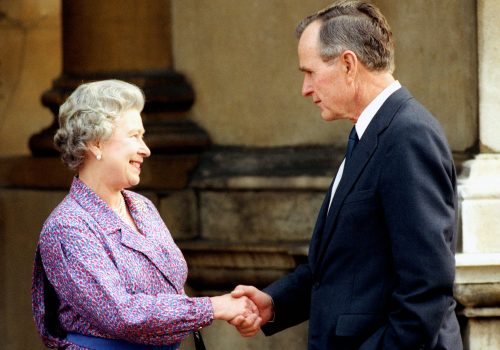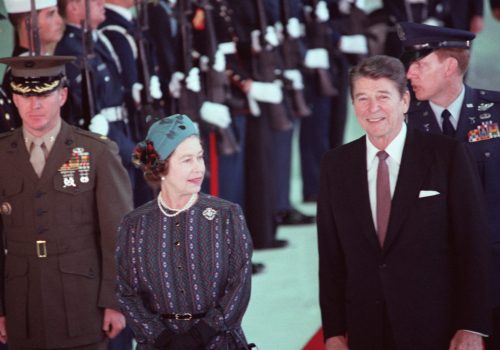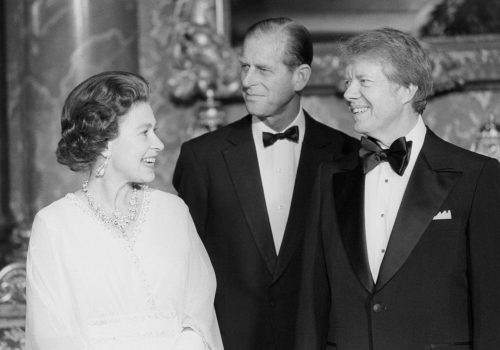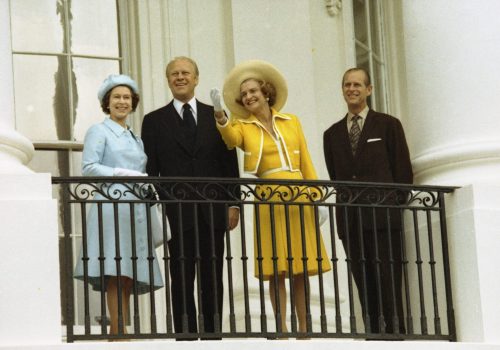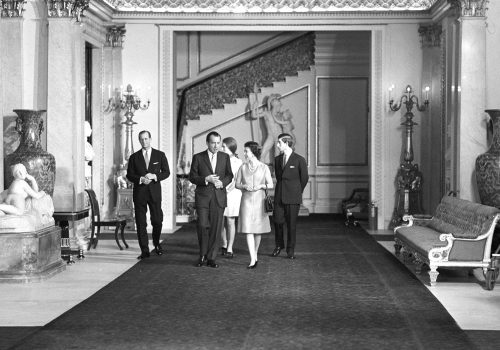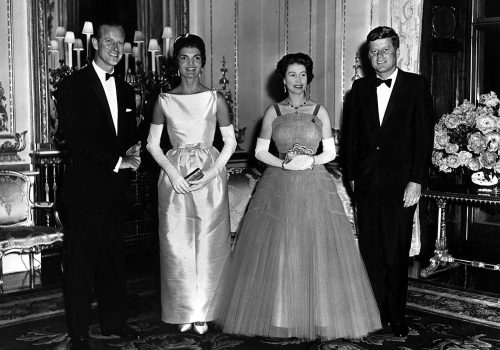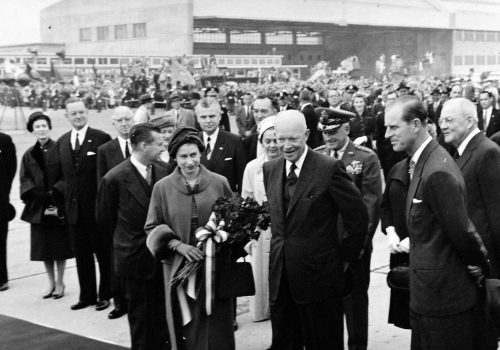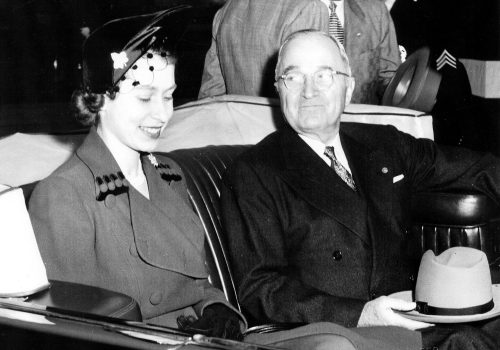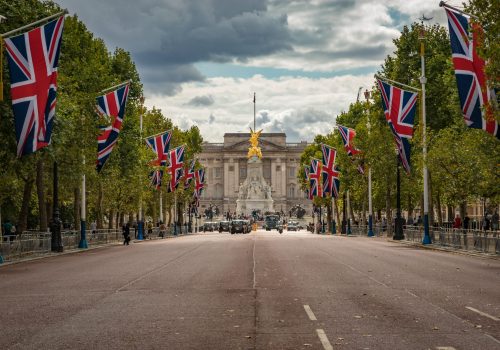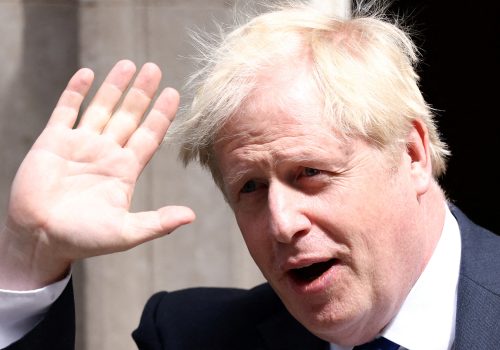The Atlantic Council remembers Queen Elizabeth II
Queen Elizabeth II, England’s longest-serving monarch, died Thursday at the age of 96. Having assumed the throne in 1952, she was a beloved, steadying presence during an era in which her nation saw its place in the world transformed. We reached out to experts across the Atlantic Council network for their reflections on her reign, her importance to the transatlantic relationship, and more.
On behalf of @AtlanticCouncil our deepest condolences to our British allies & the family of Queen Elizabeth II on her passing. She reigned with wisdom & a profound sense of duty through some of history’s most challenging chapters. She will be missed🇺🇸🇬🇧
— Fred Kempe (@FredKempe) September 8, 2022
Jump to an expert reaction:
Capricia Penavic Marshall: A personal encounter gives a window into the queen’s personality
Andrew Marshall: The end of Queen Elizabeth’s moral geopolitics
Frances Burwell: A global superstar who raised Britain’s position in the world
John M. Roberts: What does the queen’s death mean for the Commonwealth?
A personal encounter gives a window into the queen’s personality
In 2011, I had the thrill of personally meeting Queen Elizabeth II at Buckingham Palace during then President Barack Obama’s state visit. I learned that the rules of engagement include not speaking to her unless she speaks first and never turning your back on her. These edicts aren’t arrogance—they are part of what makes the queen the Queen. Otherwise, she would not command the status necessary for a monarch from her citizens.
I discovered a great deal more about her later that evening. I understood that Her Majesty’s usual custom is to retire after the dinner, but she instead mingled with the guests at the post-reception by herself—she keeps her own counsel.
I was in conversation with a few colleagues, when I turned around briefly and saw her walking our way. She wasn’t hard to miss in her white silk crepe evening gown and one of her many glittering tiaras (the imperial crown is reserved for coronations and the annual opening of Parliament). Per my custom, I backed up against the wall, thinking she wanted to pass by, but instead she stopped right in front of me and—still holding a purse (an elegant evening version) in the crook of her arm—tapped me with her finger lightly on the shoulder. “Good evening. Who are you? I have seen you everywhere throughout the day.” Awed by the moment, I was slow to respond. My brain went into overdrive. The Queen just touched and spoke to me! I took a breath to relax, reminded myself not to touch the purse, then straightened my shoulders and introduced myself. “Good evening, Your Majesty, I’m Capricia Penavic Marshall, President Obama’s chief of protocol.” She responded, “A very hard job indeed, well done.”
I could tell by her tone and expression that she, of all people—a woman whose life is governed by rules—empathized with my role and genuinely approved. Then she moved on through the crowded reception, acknowledging guests with a slight nod of her head, making our verbal engagement all the more meaningful.
—Capricia Penavic Marshall is the ambassador-in-residence and vice chair at the Adrienne Arsht Latin America Center and former chief of protocol for US President Barack Obama.
The end of Queen Elizabeth’s moral geopolitics
(Note: This is an excerpt of a full piece that can be found here.)
In contemporary terms, she had a moral perspective on globalism. There are plenty of people in modern Britain who see the country’s connections abroad as purely a commercial opportunity or a source of strategic influence—or as problems to be ignored. The queen saw them as also an obligation, though we might disparage the idea of noblesse oblige or the patrician way that obligation was often expressed. She viewed the Commonwealth relationships as more than the sum of trade flows and weapons sales. To her, Britain’s place in the world was about the connections between peoples, not just elites, businesses, states, or monarchs, important though those were.
This outlook was influenced by her religious faith, her family history, and her wartime experience. It was partly about service. “I declare before you all that my whole life, whether it be long or short, shall be devoted to your service and the service of our great imperial family to which we all belong,” she said in a speech in Cape Town, South Africa, on her twenty-first birthday in 1947, using a word that is now antique and odious.
It is necessary to note that the country the queen led often exploited, repressed, and denied rights to the people it ruled, and that her public compassion for others didn’t prevent that. Her sense of morality and concern didn’t always match up with facts on the ground.
Yet in many ways she had more in sympathy with those who would criticize the imperial past than with those who would ignore history altogether. Hers was a moral approach to the world and its problems. It was partly about her view that people had responsibilities to each other.
—Andrew Marshall is senior vice president of engagement at the Atlantic Council.
A global superstar who raised Britain’s position in the world
The death of Queen Elizabeth II marks the end of the second Elizabethan Age for the United Kingdom—an age when Britain moved from being a global empire to being part of an immensely important European peace project (the European Union) to struggling to find its own way in the world of the twenty-first century. It also became a modern country, with a leading financial services sector, health care for all (albeit with long wait times), and a diverse and global population. She was not the policymaker behind these decisions, of course. Instead, she was a source of consistency and stability that helped her country—and its citizens—weather these transitions. She was the very embodiment of dedication and selfless service to her country.
But she was also more than that. She listened to and advised prime ministers for seventy years; there was probably no quandary facing a British government that she had not seen before. She helped bind together the Commonwealth—a multi-ethnic collection of countries that, for the most part, professed support for democratic values, even if they didn’t always achieve them. Without her, the links between Britain and its former colonies would have been much weaker.
She also raised the position of Britain in the world. The pomp and circumstance of a state visit was desired by leaders around the world. Her “star power” was an enormous aspect of Britain’s soft power. She was a global superstar before those were common, albeit one who was reserved and dignified.
Most importantly, she was a symbol of service, respect, and stability for her public. Even the ones who were skeptical of the royal family found her to be a reassuring symbol of the nation and its values. Her platinum jubilee saw street parties across the land and the whole country awash in (sometimes kitschy) symbols of the queen. What other leader could claim the same?
As Elizabeth passes from the scene, her death adds to the uncertainty that a post-Brexit Britain must confront— even though she would never have acknowledged that.
—Frances Burwell is a distinguished fellow at the Atlantic Council’s Europe Center and a senior director at McLarty Associates.
What does the queen’s death mean for the Commonwealth?
There are still many monarchies around the globe—but only one person was known universally as simply “The Queen.” She epitomized how the mystiques of history could be embodied in a single person who adhered with incredible precision and devotion to the principle that she was a constitutional monarch. In those Commonwealth countries that retained her as monarch, it was the prime ministers who were both the nominal and effective heads of government. Usually, it worked. But there were crises. One came in Australia in 1975, when the governor-general—the monarchy’s representative in Australia—ordered the dismissal of Gough Whitlam as prime minister. In the United Kingdom itself, her second-to-last prime minister, Boris Johnson, was fiercely condemned for involving the queen when he asked for (and secured) in August 2019 the monarch’s approval for proroguing parliament. That effectively closed it down without formally dissolving it and thus triggering an election—on what the Supreme Court subsequently ruled was a false premise.
The queen was also widely admired in a host of republics, not least in the United States and France. And perhaps she was never happier than when watching her horses racing in Kentucky or Chantilly. But her most stunning success in a republican atmosphere was winning Irish hearts during a 2011 visit to Dublin—the site of the 1916 uprising against the British crown—when she opened her speech in Gaelic.
There is an expectation that her death will accelerate the transition of many existing countries in which she was head of state to republics. Barbados did this last year; other West Indian states will likely follow.
She was the head of the Commonwealth, a position that was essentially honorific. Although in this regard, she was also the successor to her father, George VI, the last king-emperor of India. She took the role seriously. The Commonwealth is not a unified political structure, but it does bring together fifty-six independent countries (and a number of dependent territories) for cooperation in development, trade, and culture. In the 1980s, when Prime Minister Margaret Thatcher was against the imposition of sanctions on white-ruled South Africa because of its apartheid policy, the queen made it clear to Thatcher that as head of the Commonwealth—and probably privately as well—she approved of sanctions.
By agreement of the Commonwealth countries themselves, King Charles is also likely to be named head of the Commonwealth—but it is unlikely that the title will be passed on to his heir, Prince William, the new Prince of Wales. The idea that a new UK monarch should automatically become head of the Commonwealth is one that for most Commonwealth countries has simply run its course.
There is also symbolism in the queen dying in Balmoral, probably her favorite residence. In 2003 she took the future King Abdullah of Saudi Arabia (who was then crown prince) around the vast, mountainous estate. The queen was said to be a fast driver on the roads and trails she knew, and the future king was said to have been terrified by her driving ( at that time Saudi Arabia still prohibited women from driving). There was also the time when, dressed in mundane country clothes for a picnic, she was approached by a couple of American tourists who asked her whether she had met the queen. She said she hadn’t—but then turned to her security guard and said: “Dickie here meets her regularly.”
More seriously, she was the queen of Scotland as well as of England. She believed in the three-hundred-year-old union that constitutes the core of the United Kingdom, but for more than a decade, her first minister in Scotland has come from a party that wants to see the end of the union and an independent Scotland. Under current circumstances, it is quite possible, though not necessarily probable, that Charles may have to preside over the breakup of his mother’s principal kingdom.
—John M. Roberts is a nonresident senior fellow at the Council’s Global Energy Center and senior partner with energy consultancy Methinks Ltd.
Queen Elizabeth, a steady hand for the special relationship from Truman to Biden
Further reading
Mon, Sep 5, 2022
Experts react: The United Kingdom has a new prime minister. What should the world expect from Liz Truss?
Experts react By
How will Truss balance economic challenges at home and deal with allies and foes abroad? Our experts weigh in.
Fri, Oct 8, 2021
Global Britain: An American review
Issue Brief By
What is happening to Britain in the world? Since 2016, when Brexit began with the United Kingdom’s shock “leave” vote to quit the European Union, the conversation has become almost impossible to have without entering into a fierce and polemical debate surrounding the country’s departure.
Thu, Jul 7, 2022
Experts react: Boris Johnson is resigning. What’s next for the United Kingdom on the world stage?
New Atlanticist By
Our experts gauge the reaction in foreign capitals to the drama in Westminster, and what the future might hold for the United Kingdom.
Image: Britain's Queen Elizabeth II and U.S. President George W. Bush greet students as they leave the White House in Washington May 7, 2007. REUTERS/Jim Young (UNITED STATES)
